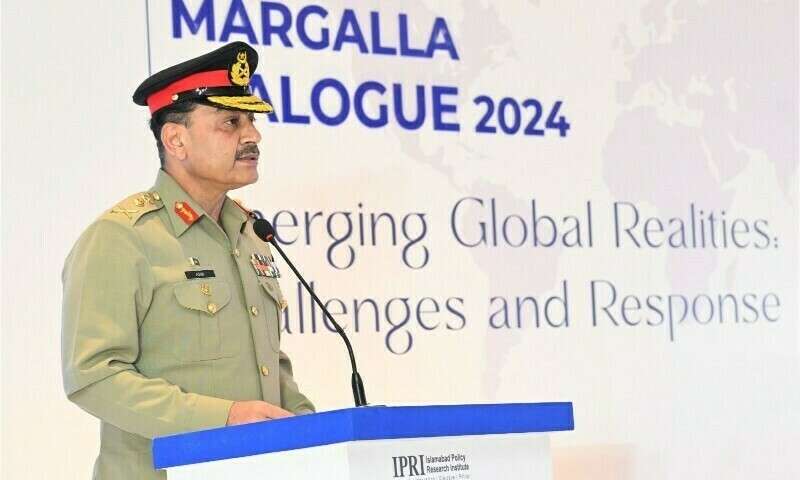ISLAMABAD — Army Chief General Asim Munir made significant remarks on Friday regarding the growing threat of unregulated social media and its impact on society. During his address at the Margalla Dialogue hosted by the Islamabad Policy Research Institute, he stressed the need for stricter regulation of social media platforms to address the rise of fake news, misinformation, and hate speech. The army chief discussed various national and international issues, including the rise of Hindutva ideology, Pakistan’s policy of neutrality in international conflicts, and terrorism emanating from Afghan soil.
General Asim Munir’s Remarks on Social Media and Fake News
In his address, General Munir expressed concern about the negative consequences of unrestricted freedom of speech, particularly in the realm of social media. He acknowledged that while technology has greatly enhanced the spread of information, it has also facilitated the dissemination of misleading and often harmful content.
According to Gen Munir, the lack of comprehensive laws and regulations governing digital platforms is allowing false and harmful narratives to spread unchecked, destabilizing political and social structures. “Without comprehensive laws and regulations, false and misleading information, along with hate speech, will continue to destabilize political and social structures,” he said. His comments underscored the army’s call for more stringent measures to regulate online discourse and reduce the unrestricted flow of information that could potentially harm the social fabric.
The Need for Stricter Social Media Regulations
General Munir emphasized that one of the most pressing challenges faced by societies today is the growth of fake news and its potential to inflame social tensions. He pointed out that the proliferation of false information can lead to real-world consequences, ranging from public unrest to the spread of hate speech, which could further polarize communities. He called for a reduction in online freedoms to safeguard society from the potential harm caused by these unregulated platforms.
The remarks made by General Munir come in the wake of growing concerns globally about the role of social media in spreading misinformation, particularly in politically volatile regions. Pakistan, like many other nations, has been grappling with the consequences of online misinformation, which has often led to public confusion, violence, and misinformation-driven political unrest.
Pakistan’s Foreign Policy: A Commitment to Neutrality
In his wide-ranging speech, General Munir also touched on Pakistan’s foreign policy stance, reaffirming the country’s commitment to non-alignment in global conflicts. He reiterated that Pakistan would not become part of any bloc politics and would instead continue its efforts to foster peace and stability worldwide.
Gen Munir’s statement comes at a time of heightened global tensions, particularly between the United States and China, and reflects Pakistan’s desire to maintain a neutral stance in these geopolitical rivalries. “We will not become part of any global conflict but will continue to play our role for peace and stability in the world,” the army chief emphasized.
This reiteration of Pakistan’s neutral stance in international politics is particularly timely, given the increasing rivalry between the U.S. and China. This competition between the two global superpowers is reshaping the global order, influencing everything from economic alliances to military strategies. General Munir’s comments reflect Pakistan’s intention to remain non-aligned while continuing to contribute positively to global peacekeeping initiatives.
Pakistan’s Role in Peacekeeping Missions
General Munir also highlighted Pakistan’s significant contributions to global peacekeeping efforts. He pointed out that Pakistan has been one of the largest contributors to United Nations peacekeeping missions, with over 235,000 Pakistanis having served in these missions. Tragically, 181 Pakistani soldiers have lost their lives in the course of their duties in these missions. The army chief emphasized that Pakistan’s long-standing commitment to peace and stability around the world remains unwavering.
Addressing Extremist Ideologies
Another important aspect of General Munir’s speech was his focus on the threat posed by extremist ideologies, particularly those emanating from India’s ruling government. The army chief condemned India’s Hindutva ideology and described the ongoing human rights abuses in occupied Kashmir as part of the larger design of the Hindu nationalist movement.
“The resolution of the Kashmir dispute, in accordance with United Nations resolutions and the aspirations of the Kashmiri people, is inevitable,” Gen Munir declared. He reaffirmed Pakistan’s position on the Kashmir issue, stressing that any resolution must align with the wishes of the Kashmiri people and adhere to international law.
The Threat from Afghanistan: Terrorism and Border Management
Another topic that Gen Munir addressed was the ongoing threat posed by terrorism emanating from Afghanistan. He emphasized Pakistan’s concerns regarding the use of Afghan territory by terrorist groups to launch attacks against Pakistan. The army chief expressed his expectation that the Taliban administration in Afghanistan would take stronger action to prevent the use of Afghan soil by militants.
To bolster security along its western border, Pakistan has implemented a comprehensive border management regime aimed at curbing unauthorized cross-border movement and preventing terrorist infiltration. General Munir noted that Pakistan’s efforts to secure its western borders were crucial to maintaining national security and regional stability.
The Expanding Threat of the TTP
General Munir also issued a warning about the growing threat posed by the Tehreek-e-Taliban Pakistan (TTP), a banned militant group operating along Pakistan’s border regions. He pointed out that the TTP’s activities were not confined to Pakistan’s borders and could potentially expand beyond the country’s territory. Referring to the group as Fitna al-Khawarij, General Munir highlighted its connections to international terrorist organizations and the increasing risk it poses to regional and global security.
Conclusion: The Path Forward for Pakistan’s National Security
General Asim Munir’s remarks provided a comprehensive overview of the challenges facing Pakistan today, both internally and in terms of its foreign policy. From the threat of misinformation on social media to the growing concerns about regional security, the army chief called for stricter regulation of digital platforms and a continued commitment to Pakistan’s long-standing policy of neutrality in global conflicts.
The army chief’s speech was a clear indication of Pakistan’s strategic priorities as it seeks to navigate a complex international landscape while addressing internal challenges. By emphasizing the importance of peacekeeping, securing its borders, and tackling the spread of extremist ideologies, Pakistan continues to position itself as a stabilizing force in a turbulent region.
FAQs
1. What did General Asim Munir say about social media regulations?
General Munir called for stricter regulations of social media platforms to curb the spread of misinformation, fake news, and hate speech, emphasizing the importance of comprehensive laws to stabilize political and social structures.
2. What is Pakistan’s stance on global conflicts, according to General Munir?
General Munir reaffirmed Pakistan’s long-standing policy of neutrality in international conflicts, stating that Pakistan would not align itself with any global bloc but would continue contributing to global peace and stability.
3. How has Pakistan contributed to global peacekeeping efforts?
Pakistan has contributed over 235,000 personnel to United Nations peacekeeping missions, with 181 Pakistanis making the ultimate sacrifice in the line of duty.
4. What did General Munir say about India’s Hindutva ideology?
General Munir condemned India’s Hindutva ideology, describing it as a threat to regional stability and highlighting its connection to the ongoing human rights abuses in occupied Kashmir.
5. What is Pakistan’s approach to the Taliban and the TTP threat?
General Munir emphasized Pakistan’s expectation that the Taliban administration in Afghanistan would prevent the use of Afghan soil by terrorist groups and warned about the expanding threat of the TTP beyond Pakistan’s borders.
MUST READ:



